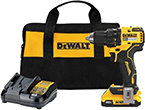It is absolutely amazing the money that people will spend to protect their identity. Protecting your identity doesn't really require you to spend a ton of money. In fact, protecting your identity doesn't really require that you spend any money. All you really need to do is start organizing your life a little bit better, and being aware of what is going on around you. In order to make this as easy of a task as possible, below are six simple steps that you can take to begin protecting your identity today. You will be amazed at how simple and effective these simple steps are.
- Protect your bubble. Everyone has a personal bubble that no one really should enter without permission. This is especially true when you are in line at the ATM. Usually this personal bubble is about an arms length away, though some people have no problem with others being closer. What this means is that when you are at an ATM you should never have someone sitting right at your shoulder. If they are, there is a good chance that they can see your PIN code.
- Be consistent. When you fill out any kind of application, you need to always fill it out the exact same way each and every time. This way, when your bills show up, they will have the same name on it. This will allow little to no wiggle room for anyone to work with when they try to steal your identity.
- Limit your credit. One of the biggest problems that many people have in protecting their identity is that they have too many credit cards. At most you should only have two, or maybe three. The fewer credit cards that you have, the easier it will be for you to keep track of them and to know when to look for the bills.
- Know your credit. Everyone is entitled to a free credit report from each of the credit agencies each year, take advantage of it. Compare the information that these contain to your personal credit papers, and make note of any differences or discrepancies. If you find any, notify the credit agency immediately. This will help minimize any mistakes. In addition, you need to know when your credit card bills are due to arrive, and never leave them in your mail box. At the same time, always drop off your paid bills at the post office.
- Protect your Social Security number. Avoid giving out your Social Security number as much as possible. Never give your Social Security number online, unless it is on a secure and trusted network. Any paperwork that you no longer need, which contains your Social Security number or any other identifying information, should be shredded. This way you can be more certain that your information will be kept safe.
- Secure purchases only. If you are going to be making any purchases online, then you need to make sure that it is from a secure and trusted site only. The easiest way to tell if a site is secure or not is to look up at the URL, if it says https:// instead of http://, then you know that the site is secure. Another method that you can use is to see if there is either a Trust-e symbol, or a Better Business Bureau online seal.
Author Bio
Lee Wyatt
Contributor of numerous Tips.Net articles, Lee Wyatt is quickly becoming a regular "Jack of all trades." He is currently an independent contractor specializing in writing and editing. Contact him today for all of your writing and editing needs! Click here to contact. Learn more about Lee...
Maintaining a Chainsaw
A chainsaw is a great tool to have around the home, but without proper maintenance it can quickly become an expensive ...
Discover More
Simple Sandbox Plans
If you are really thinking of adding a play area to your landscape, then you cannot forget a perennial favorite of all ...
Discover More
Getting the Best Car Rental
Whether you are going on a long business trip, or simply a weekend getaway a car rental can be a huge help. Not only will ...
Discover More
Email Filing
No matter what our profession, email is always becoming more and more important. What do you do though, if you want to ...
Discover More
Being Organized for Tax Time
Tax time is a stressful time for everyone. Make it a little bit less stressful by getting organized now, so when that ...
Discover More
Organizing Tax Records
For a variety of reasons, tax time is one of the most stressful times of the year. Instead of waiting till the last ...
Discover More

Comments